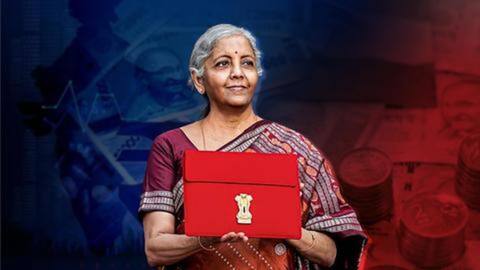Key numbers to watch out for in Union Budget today
What's the story
Finance Minister Nirmala Sitharaman will present her seventh consecutive budget, a plan that aims to chart India's path toward development by 2047, at 11:00am on Tuesday.
The forthcoming budget is anticipated to offer tax relief for the middle class, potentially increasing their disposable income due to current tax buoyancy.
The market also anticipates that the fiscal glide path will be maintained to reduce the fiscal deficit to 4.5% of GDP by 2025-26.
Fiscal outlook
Fiscal deficit, capital expenditure in focus
The budgeted fiscal deficit for the current fiscal year stands at 5.1%, as projected in the Interim Budget in February, compared to 5.8% in the previous fiscal year.
The government's planned capital expenditure for this fiscal year is set at ₹11.1 lakh crore, a significant increase from ₹9.5 lakh crore last year, with a focus on infrastructure creation and encouraging states to boost capex.
Revenue forecast
Projected tax revenue, GST collection increase
The Interim Budget in February had estimated gross tax revenue at ₹38.31 lakh crore for 2024-25, marking an 11.46% growth over the last fiscal year.
This includes ₹21.99 lakh crore from direct taxes and ₹16.22 lakh crore from indirect taxes.
Goods and Services Tax (GST) collection in 2024-25 is projected to rise to ₹10.68 lakh crore, a boost of 11.6%.
Economic outlook
Government's borrowing, GDP growth projections
As per the Interim Budget, the government's gross borrowing budget for the current financial year is ₹14.13 lakh crore.
Market observers are closely watching this borrowing from the market to fund its fiscal deficit due to higher-than-expected dividends from the Reserve Bank of India (RBI) and financial institutions.
India's nominal GDP growth (real GDP plus inflation) in the current fiscal year is estimated at 10.5% to ₹327.7 trillion, with real GDP growth projected at 7.2%, according to RBI data.
Expenditure plan
Budget focus on key schemes and crucial sectors
The upcoming budget will also concentrate on expenditures for key schemes like the Mahatma Gandhi National Rural Employment Guarantee Act (MNREGA) and crucial sectors such as health and education.
The Budget Session of Parliament began on July 22 and is expected to conclude on August 12.
The session is likely to have 16 sittings over these 22 days.
On the first day, Sitharaman tabled the 2024 Economic Survey document.
